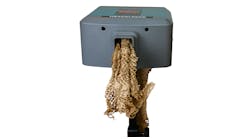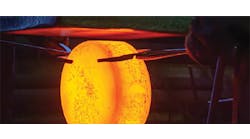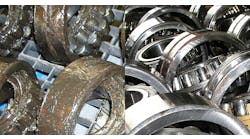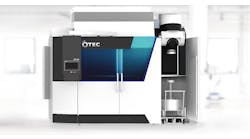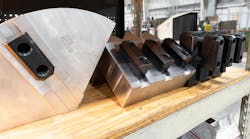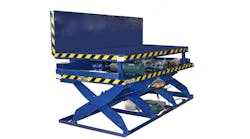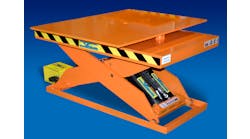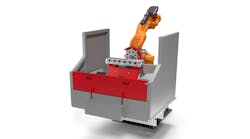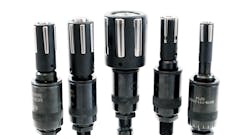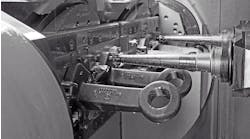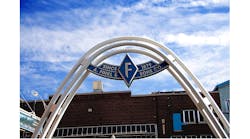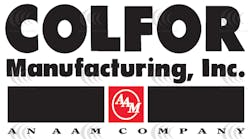The federal Occupational Safety and Health Administration recently cited A. Finkl & Sons Co. for 26 alleged safety violations at its Chicago forging operation, including two willful violations concerning the company’s failure to provide fall protection around open pits and to address multiple hazards found in crane inspections. The penalties proposed in the citations total $352,700.
Finkl produces forging die steels, plastic mold steels, diecasting tool steels, and custom open-die forgings, with a total production reported at 100,000 tons per year. The company opened a new melt shop on the South Side of Chicago late last year, and plans to relocate its operation to that site.
The violations were discovered in the course of an inspection that OSHA, a U.S. Dept. of Labor agency, launched in February on the basis of a complaint that Finkl was operating with equipment in need of repair. OSHA announced the violations in early August, and Finkl was given 15 business days from its notification to comply with the citations, request an informal conference with OSHA's area director, or contest the findings before the independent Occupational Safety and Health Review Commission.
OSHA categorizes as “willful violations” those committed with intentional knowledge or voluntary disregard for the Occupational Safety and Health Act of 1970, or with plain indifference to worker safety and health. Under the law, employers are responsible for providing safe and healthful workplaces for their employees.
A “serious violation” is issued when OSHA finds there is substantial probability that death or serious physical harm may result from a hazard about which the employer knew, or should have known. A “repeat violation” is one for which an employer has been cited previously, or a similar violation of a standard, regulation, rule or order at any other facility in federal enforcement states within the previous five years. “Other-than-serious” violations are those that have direct relationship to job safety and health, but probably would not cause death or serious physical harm.
In this case, the two willful violations that OSHA issued concern Finkl’s failure to ensure that standard railings and/or covers are installed to guard open pits; and failure to correct deficiencies identified by crane inspections. The deficiencies listed include missing bolts, inoperable radio controls, and problems with bridges, trolleys, and main hoist brakes. A willful violation is one committed with intentional knowing or voluntary disregard for the law's requirements, or with plain indifference to worker safety and health.
The 22 serious violations involve Finkl’s failure to install hoist guards on industrial cranes; ensure that independent hoisting units on all cranes that handle hot metal have at least two holding brakes; ensure that all crane trolleys and bridges are equipped with brakes that have ample thermal capacity for the equipment's frequency of operation, and which prevent the impairment of functions due to overheating; ensure that a thorough inspection of all crane ropes is completed; and ensure that loads are lifted in a manner to prevent swinging on cranes and have a responsible person on-site with knowledge of cranes.
OSHA also cited Finkl for failing to ensure that ladders are placed in a manner that provides secure footing for workers, storing LPG containers away from stairways or other exit areas, adequately outline the rules for lockout/tagout procedures, guard live electrical parts over 50 volts, protect electrical conductors entering boxes from abrasion, and visually inspect portable plug- and cord-connected equipment for defects.
One repeat violation was issued to Finkl for failing to ensure that powered industrial trucks are examined prior to being placed into service, and to keep the trucks in a clean condition, free from lint, excess oil and grease. A similar violation was cited at the Chicago plant in 2006.
One other-than-serious violation was issued to Finkl for failing to create, certify and post the OSHA 300A summary log of injuries and illnesses, or an equivalent form for the year 2011 by February 1, 2012.
According to OSHA’s Chicago regional administrator Nick Walters, "A. Finkl & Sons Co. has demonstrated a blatant disregard for the safety of its employees. When employers fail in their responsibility to provide a safe workplace, OSHA will take all necessary action to protect workers on the job."
Because of the willful and repeat violations, “and the nature of the hazards,” OSHA placed A. Finkl & Sons Co. in its Severe Violator Enforcement Program. That program concerns “recalcitrant employers that endanger workers by committing willful, repeat or failure-to-abate violations,” and mandates targeted follow-up inspections to ensure compliance with the law.
OSHA noted that Finkl’s operation has been inspected 24 times since 1970, with 17 inspections resulting in citations for various violations. Inspections in 2006 and 2007 resulted in citations for willful and repeat violations related to fire and fall hazards.
